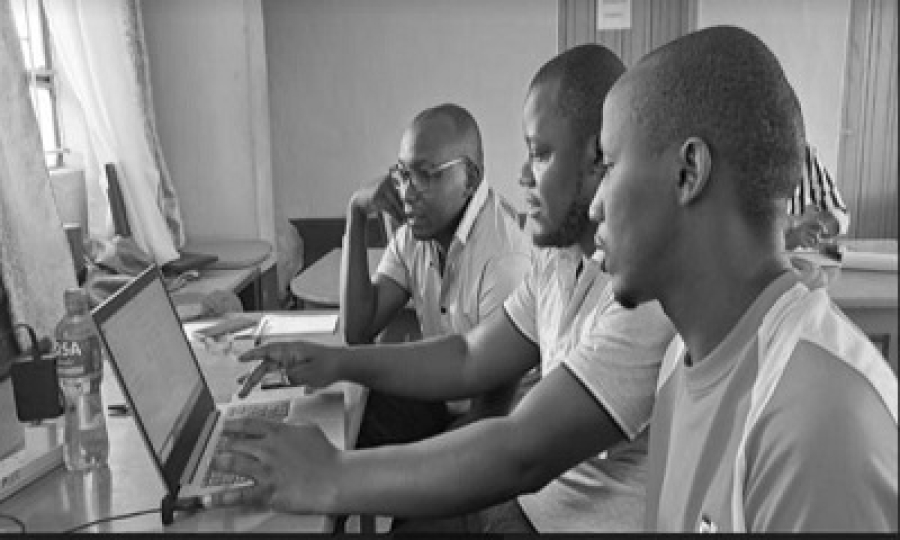Effective Feedback on Lesson Observation
By Thuo Karanja
During school-based teacher professional development activities, particularly during lesson study, teachers are expected to observe each lesson. A group of biology teachers can collaboratively plan and observe a class implemented by one of them. Pedagogical leaders in a school, such as heads of departments or subject heads, could observe a lesson implemented by teachers in their department. Further, experienced teachers could observe classes implemented by newly recruited teachers during mentoring and coaching. In all these cases, a fundamental expectation is the delivery of feedback. In this article, we focus on the basic tenets of lesson feedback without necessarily getting into the details of pedagogy.
Teachers from Isiolo County collaboratively preparing a lesson
Feedback is a relationship of respect and trust. It is about helping people improve, not about making them feel bad. People want to receive feedback from those they trust. It should not be a senior-junior relationship. Feedback is effective when a teacher knows that the ones giving feedback believe in their abilities, appreciate their current efforts (to plan and implement a lesson) and recognise their growth potential. This way, teachers will most likely view the feedback as constructive and utilise it for improvement. Feedback is better-done face to face. Face-to-face feedback [as opposed to feedback through video conferencing or phone calls] is most effective and dynamic. Face-to-face conversations allow parties to ask questions and dig deeper into the issues at hand and enable contextualising vocal tones, body language and emotions. These are essential aspects of communication.
While a teacher needs to be told the reality of their observed lesson (esp. if one has significant concerns), feedback ought to be presented in a balanced perspective. The observer needs to point out some positives in the lesson, things that impressed you, such as effective learner participation, well-organised and executed lesson activities, logical flow of the lesson or the way a teacher handled a question(s). If some aspects of the lesson did not meet your expectations, frame your discussion to make the teacher feel that; while their current efforts and lesson outcomes are appreciated, there is room for improvement and growth. Focus on specific issues and not generalisations. What was good or needed improvement about the lesson: what did you observe; what was the evidence? Demonstrate to the teacher that you were keen on observing their lesson. With evidence (written notes), tell the teacher what was good and what needs further effort. Don't use statements such as; 'The lesson was nice' [I hear that a lot], 'That was a good lesson', 'great lesson' and 'Nice work'. Suggest to the teacher specific issues and areas to work towards or elements they can focus on replicating. Be truthful [with facts and notes], and don't mislead the teacher into thinking their performance is better than it is. Provide suggestions; 'could you consider doing it this way?‘and avoid using words such as 'never' and 'always' As you make your observations and suggestions, allow the teacher to also talk about their lesson and explain particular perspectives. Please point out the impact of the observations, both positive and negative and how the outcome affects their practice, learner achievement and the well-being of the school.
Do not personalise the feedback; distinguish the teacher ('the person') from their actions and avoid making claims akin to personal attacks. Refrain from using language that is harsh, demeaning or accusatory. Let the teacher know, for example, that you noted some errors in the lesson plan but do not tell them that they lack attention to detail or are careless writers. If a reaction to a learner's response to a question was demeaning, dismissive or disrespectful, point it out from the perspective of its effect on the learner(s). Don't tell the teacher they were rude and abusive to the learner
Finally, feedback needs to be given consistently. It should develop to be a regular practice and pedagogical culture for a school, with expectations, performance standards and indicators. Further, feedback should be timely; delivered immediately after a lesson when ideas are still fresh in the minds of the teacher and the observers. Keep it short and focused on the present and the future. This makes the outcomes of the feedback conversations and outcomes more relevant and actionable. A school could develop lesson observation tools or use existing ones from the Teachers Service Commission (TSC) or from CEMASTEA.
Latest from Esther Nyambura
- CEMASTEA Hosts Successful INSET Centre Principals’ Workshop
- CEMASTEA Conducts Successful Holistic Learning Training for Rwandan Teachers
- Empowering Quality Standards and Assurance Officers (QASOs) for Enhanced STEM Education
- Science and Mathematics Teachers Pilot Symposium: Innovative Classroom Practices
- CEMASTEA Strategic Plan 2023 – 2027: Key Highlights

